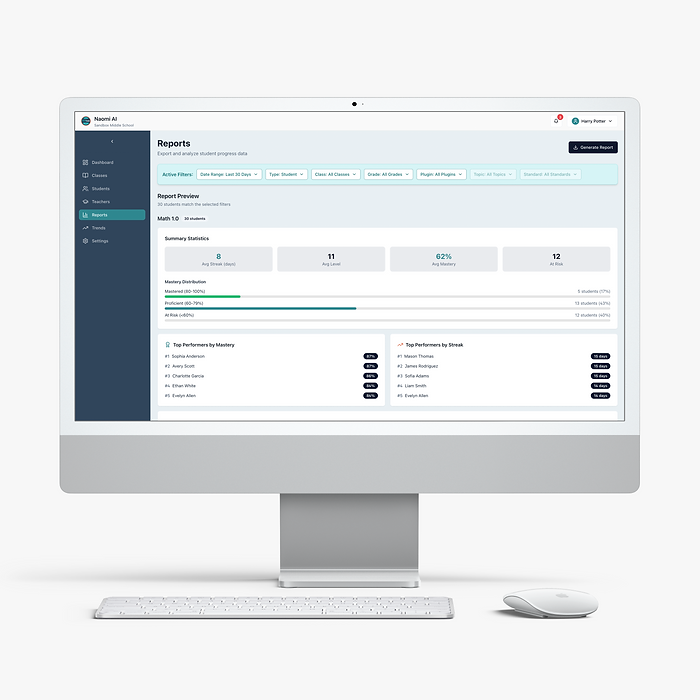AI Intervention for At-Risk Learners—Rapidly Shipped & Delivered
I directed strategy and delivery end-to-end: aligning scope to pilot adoption requirements, coordinating sprints, running in-house usability tests, and driving bug triage. The goal was to ship a school-ready, adaptive platform that shortens time-to-support for vulnerable students and positions the product for scale and fundraising.
Role
Product Director
Client
24/7 Teach

We built a student-facing AI app—but critical gaps prevented pilot adoption
Conversations with partner schools and internal retros surfaced three root causes:
Scope mismatch
We launched with a Student view, but schools required Teacher and Administrator dashboards.
Slow production velocity
Manually coding, designing, and producing domain-specific learning content could not keep pace with school timelines.
Non-adaptive experience
The application offered no baseline assessment or adaptive remediation, limiting its ability to meet learners at their level.
Making an executive decision to pivot the platform build
Initially, we designed in Figma and coded in GitHub. After reaching a manual production ceiling, we shifted to Loveable for prompt-driven design and code generation
Multi-stakeholder meeting

Student View (Initial build)

Aligning design to customer requirements for adoption
Pilot interviews established a clear adoption requirement: Teacher and Admin views were necessary for paid participation. Educators needed to assign targeted problem sets (e.g., proficiency-based math modules), and monitor progress in real time; administrators needed schoolwide visibility into usage, completion, and growth.
We expanded the scope from a single learner view to a multi-stakeholder platform that delivers these workflows end to end.

Admin Platform

Teacher Platform
Accelerating production with AI to meet deadline
We used AI to generate content, accelerate UI buildout, and automate parts of production to meet school-year deadlines.
Human oversight remained integral—we validated outputs end to end through review, testing, and standards enforcement, releasing only when acceptance criteria were met.

Adaptive AI to reduce time-to-support
We use AI to meet each student at their current level: diagnostics set starting points, adaptive paths adjust rigor, and kid-friendly explanations, hints, and non-repetitive practice build mastery before advancing.
Vulnerable students get immediate help instead of waiting, protecting them from falling behind; teachers and admins get real-time visibility (who’s stuck, where, and why) to target small-group intervention and monitor progress.

Adaptive AI platform ready for three pilot programs and positioned for venture funding
Multi-stakeholder dashboards, standards-aligned content, and AI-assisted production moved us from concept to school-ready—de-risking rollout and establishing traction for fundraising.
